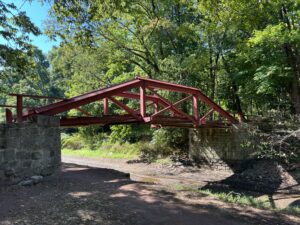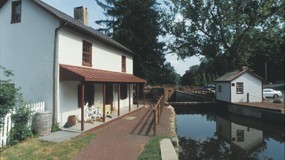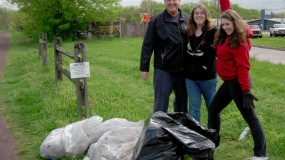The History and Preservation of Camelback Bridges
Sommer’s Bridge Restoration—A Family Legacy Lives On
The Canal has many tales to tell, and so do the bridges and buildings along the way. The Sommer’s Bridge is no exception. In its day, farmers, quarrymen, and the townspeople used this bridge. Today, it is used solely as a pedestrian walkway. And due to its location, it gets a great deal of foot traffic.
 Sommer’s Bridge is one of the six remaining authentic camelback bridges along the towpath. These structures can be found as far south as Yardley, and as far north as Raubsville. They were built with several functions in mind. First, the design, also known as a Queenspost style bridge, had an arched design that better accommodated the crew on the canal boats. They also connected two land parcels separated by the Canal’s installation.
Sommer’s Bridge is one of the six remaining authentic camelback bridges along the towpath. These structures can be found as far south as Yardley, and as far north as Raubsville. They were built with several functions in mind. First, the design, also known as a Queenspost style bridge, had an arched design that better accommodated the crew on the canal boats. They also connected two land parcels separated by the Canal’s installation.
When they were first constructed, the camelback bridges were wooden structures with iron fasteners that added to the bridge’s stability. Workers placed these spans on stone abutments with wing walls that held the bridge about eight feet over the Canal.
The stone also has historical significance. Local materials were used to create these structures, so each one is unique depending on the camelback bridge’s location. High-quality brownstone from nearby quarries was the stone of choice in Yardley and Taylorville. Ashlar, from Lumberville, was transported north to Durham and used to build many stone abutments in that region.
The Friends have, with the help of donors and supporting organizations, restored all but one of the remaining bridges. Several camelbacks, like Sommer’s Bridge, have been restored or repaired more than once. Wooden structures are prone to decay and rot, even when maintained. So, we were not surprised that the Sommer’s Bridge experienced some structural issues this past winter that necessitated its closing. In May restoration began. It took a bit longer than originally planned as additional repairs were uncovered during the first phase of the work.
Most of the initial funding was donated by the Sommer Family. The family has a long history with the Canal and the towpath. Dr. George Sommer and his wife Anna purchased the property adjacent to the Bridge over seventy years ago. The Sommer Family have been active members of the Friends and supporters of preserving and restoring the canal structures and towpath. As is the custom with all camelback bridges, this bridge was named for the family that owned the property.
We recently received this reminiscence from the Sommer Family that we wanted to share:
“From 1951 through 2022, four generations of the Sommer family have enjoyed their property stretching from the Canal to the river. The Bridge has a very special meaning. During the 20th century flood in August of 1955, the Delaware, fed by torrential rains upriver, rose quickly on a bright summer’s day. Some family members at home were about to be trapped by the rising waters. The two youngest Sommer sisters, Anna aged six and Julie age 4, were assisted by a neighbor navigating the water on a path leading toward the Bridge and high ground. Many other area residents had the Bridge to thank for their means to safety. The Sommer Family is delighted to help the Friends of the Delaware Canal in the excellent rehabilitation of the Bridge. We do this in memory of our late family members, including Juliet C. Sommer, who died in September of 2020.”
Over the past six months, we have received contributions from other generous donors. However, additional funding will be needed to finance the completed project fully. If you would like to contribute to this bridge restoration fund, please visit our website or email us at friends@fodc.org.

